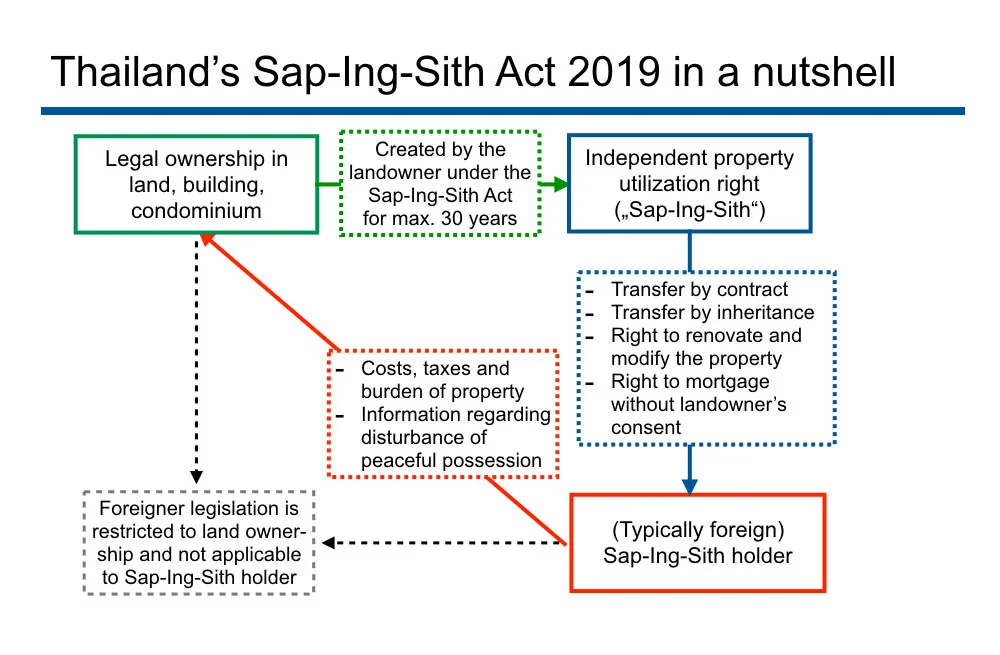A little under a year ago Thai National Legislative Assembly introduced The Sap-Ing-Sith Act to encourage foreigners to invest in property in the Kingdom. Until then, The Thai Land Code stipulated that foreigners were not permitted to own land in Thailand, although there were a few exemptions. Until now, they've had to choose structures such as leasehold or accept that the ownership of a property is by a registered Thai company which involved potential risks and legal issues if ownership agreements were not set-up correctly or managed properly.
The Sap-Ing-Sith Act eliminates certain restrictions and limitations that the standard lease of immovable property possessed under the Civil and Commercial Code.

Saving money to invest in house or property in the future. Business Finance Concept. | Credit: Shutterstock by PIC SNIPE
Sap-Ing-Sith translates into 'property relying right' or the right to use an immovable property as specified under the act. The act provides overseas property investors with a solid structure that avoids the necessity to set-up a Thai company with a majority of Thai shareholders. After each party (land or lease owners and the property owner) has reached an agreement, the applicant must register the Sap-Ing-Sith at the Land Department for a fee of THB20,000. If the plot of land is subject to a mortgage, consent from the mortgage holder is also required. When registration is complete, the Sap-Ing-Sith holder will receive a certificate from the Land Office. The Land Office will retain a duplicate of this certificate.
The Sap-Ing-Sith certificate overrides any rights of a standard leasehold and is legally distinct with several key differences. The rights are as follows:
Rights and obligations of the owner of immovable property are subject to a Sap-Ing-Sith
- Cannot create other rights attached to the property without written consent from the Sap-Ing-Sith holder
- Retains the right to transfer ownership of the property, or can use it as security for mortgage or business collateral. If the immovable property is already mortgaged or placed as business collateral, written consent from the mortgagee or the business collateral receiver is required to create the Sap-Ing-Sith
- Cannot terminate the Sap-Ing-Sith before its expiration period if termination affects the right of a third party who has, for value and in good faith, acquired and registered his or her rights
- Retains ownership of immovable property, has the right to follow and recover the property from any persons not entitled to seize it, and has the right to prevent unlawful interference
Rights and obligations of a Sap-Ing-Sith holder
- Has the right to use immovable property according to the details contained within the certificate issued by the Land Office, and used in accordance with property laws
- Can transfer the Sap-Ing-Sith to another person, use it as security for a mortgage or transfer by inheritance
- Liable for the immovable property as if they are the owner, excluding the right to follow and recover the property from persons not entitled to seize it and the right to prevent any unlawful interference with it (which the owners retain). The Sap-Ing-Sith holder is obliged to inform the owner in case of any disturbance that may warrant the owner to want to protect it
- Has the rights to make alterations or additions to the immovable property without the consent of the owner. Any alterations or additional buildings on the property by Sap-Ing-Sith holder belong to them for the duration of the certificate. Afterwards, they revert to the owner unless agreed between parties. In a condominium unit, any addition or alteration made shall still belong to the owner
- The immovable property must be returned to the owner upon expiration of the Sap-Ing-Sith period, in the same condition, unless otherwise agreed by both parties

Sap Ing Sith is Thailand's Land code 2.0 | Credit: Pugnatorius
The Sap-Ing-Sith agreement is an interesting alternative for foreigners wishing to purchase land in the Kingdom of Thailand. Not only does it have numerous advantages such as being able to take out a mortgage on the property but it gives the Sap-Ing-Sith certificate holder the right to transfer the rights without the consent of the property owner. Whilst the Sap-Ing-Sith is still only valid for 30-years, the same as a traditional leasehold, it shows that the Thai laws are moving in a positive direction that will accommodate foreign investors in a welcome and positive manner. It is still a very new option available on the market. Home in Phuket will monitor its successes over the next few months.
| Lease of immovable property | Sap-Ing-Sith | |
| Creator of right | Lessor does not need to be the owner | Owner of the land who possesses title deed (chanote), owner of building constructed or owner of the condominium unit |
| Establishment of right | Made in writing and signed by liable parties if the lease is for over three years, registered with the land office | Must be registered with the land office and issued with a Sap-Ing-Sith certificate |
| Ownership of construction and alterations on the land | The lessee cannot make any alterations or alterations to the property without the lessor's consent | Sap-Ing-Sith holder has the right to make alterations in, or addition to, the immovable property without the owner's consent |
| Liability of defect | Lessor is liable for any property defects | Sap-Ing-Sith holder is liable for property defects as if it were an owner of a property |
| Transfer of rights | The lessee cannot transfer its right in any part to a third person without the lessor's written consent | Transferable without the owner's consent |
| Mortgage | Mortgaged for a lease of immovable property for commercial and industrial purposes | Can be mortgaged |
| Inheritance | Ends on the lessee's death | Can be inherited |



















